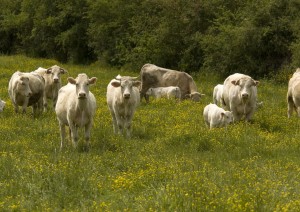Nature and the public realm: policy

Farmers receive subsidies as a result of the European Union’s Common Agricultural Policy.
Nature is affected by public spending and the policies that determine how public money is spent. Policies such as the Common Agricultural Policy, the Common Fisheries Policy, housing policy and others have a profound effect on nature in Britain.
Some public funds are used to benefit nature – perhaps the most successful one is the Heritage Lottery Fund, which has provided many millions of pounds of “public” money to support nature in Britain. Funds from Defra also support Natural England, The Forestry Commission and the Environment Agency to support Nature, to a greater or lesser extent. This funding has been cut repeatedly and NE’s independence from Defra has been removed, making them entirely unable to influence Government policy on nature. PNN will work to strengthen the value that Nature is given in Government policy, through traditional advocacy routes.
Other public funds, in particular the Common Agricultural and Fisheries Policies of the European Union, are mostly antagonistic to nature. These are called perverse subsidies, because they claim to do one thing, but in the event do the opposite.
PNN’s position is that despite repeated efforts to fix the CAP and CFP, they are now unfixable and need to go. They would be replaced by an approach which rewarded those farmers and fishermen who made positive contributions towards nature on their land (or through their fishing methods), while all others would be subject to a tax and regulation regime which worked along the Polluter Pays principle, with a strong regulatory base-line. A similar approach would be adopted to all other public subsidies and support mechanisms (including tax policy), including for renewable energy production.
While most of the Common Agricultural Policy funding goes to landowners without any requirements to act to help nature, a small proportion goes into what is known as Agri-Environment schemes. The most recent one is called Countryside Stewardship.
Landowners are paid to retain nature on their farmland, where it fits in with farming practice. In some cases farmers can be paid generously to recreate habitats that have been lost. However, these schemes are very short-term and provide no security for farmland wildlife. The current scheme operates on a five year timetable. Agri-environment schemes effectively operate as a scheme whereby Society rents nature from landowners; the rent increases according to how valuable society regards the nature to be, but there is no security of tenure. At the end of the agreement, unless other safeguards are in place, the nature can be evicted.
Land Value Tax
Taxation provides money for the state to spend on things which cannot be funded by other means. Where nature needs money spending on it, taxation is an important source of that money. Examples of the need for public spending to benefit nature include:
- Restoring nature on places which have been damaged in the past.
- Managing places for the specific benefit of nature – this could be on public land or private land.
- Purchasing places that are particularly valuable for nature, now or in the future.
- Monitoring and evaluating the state of nature to inform activities and policies which have an impact on it.
- Carrying out research to identify the needs of nature.
- Publicising the plight of nature and its importance, both for its intrinsic value and for the benefits it provides to people.
- Encouraging people to spend more time in nature.
Our current taxation system does not adequately recognise the important role land ownership and land-use has on the nature which occurs there. The taxation system, particularly the rules around inheritance and capital gains tax, are considered to operate against the natural value of land. One alternative approach to taxing land is to introduce a land value tax. The land value tax concept originated with the Victorian economist David Ricardo, and was developed by the American economist Henry George. George argued that a Land Value Tax could theoretically replace all other types of tax. People Need Nature is interested in exploring how different approaches to Land Value Tax could be used to benefit nature on public and private land.
Rewilding public land
Nature has existed for billions of years without human intervention. It is only in the past 70,000 years that we, Homo sapiens, have existed and started to fundamentally alter our own ecosystems to meet our particular needs. Since the dawn of agriculture, people have increasingly influenced, through management, the land. In doing so, we have created farmed and forested landscapes. These were until the 20th century, composed of what are called semi-natural habitats. Semi-natural habitats can be defined as communities of wild plants and animals which have developed over periods of hundreds or thousands of years, as a result of the interplay between human activities and wild nature. Semi-natural habitats are dependent on management of one kind or another, whether that is mowing a meadow, cutting trees in a coppice, or burning a heathland. Nature Conservation has considered these semi-natural habitats, and the species which live in them, to be the nature that needs conserving. Species or habitats that are especially rare, or disappearing rapidly, have been identified as being the most important elements of nature to focus on – leading to projects like the Species Recovery Programme and its successors. People generally accepted that species that used to occur in the UK but are now extinct, such as the Wolf, Bear, Lynx or Beaver, were not going to return on their own, and the idea of deliberately bringing them back was dismisssed as whimsy.
In the last several decades there has been a move to challenge this view and some have taken the matter into their own hands. Otters were reintroduced to England in the 1990s and Beavers to Scotland shortly after. There is now a wild beaver colony on the River Otter in Devon, at least temporarily. Wild Boar which escaped from boar farms in the 90s have now become naturalised in various places, particularly the Forest of Dean and Kent.
Advocates of Rewilding, notably George Monbiot, argue that the nature conservationist focus on semi-natural habitats is mistaken, and true ecosystem recovery will only happen when we cease to manage nature and allow it to look after itself. In particular, by reintroducing apex predators, rewilding will enable trophic cascades to be restored, and this willl help with problems such as the damagingly large deer population in Great Britain.
People Need Nature does not advocate one approach to nature over another. We recognise that semi-natural habitats are highly valued by people and support the need to protect the still disappearing resource of semi-natural habitats and the species they support. We also believe that the concept of rewilding is valid and could be a new way to engage people about the importance of nature. We see the two approaches as being complimentary.
We look forward to working with all organisations interested in nature, including the newly formed Rewilding Britain. One area we are interested in is the scope to “rewild” large areas of publicly owned land, perhaps a combination of land owned by the Forestry Commission, the Crown Estate and land owned by the Ministry of Defence. Our CEO Miles King has written about rewilding on his blog.
